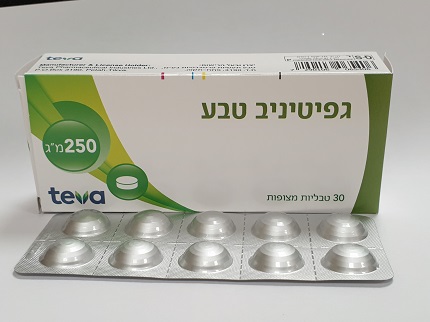Quest for the right Drug

גפיטיניב טבע ® GEFITINIB TEVA ® (GEFITINIB)
תרופה במרשם
תרופה בסל
נרקוטיקה
ציטוטוקסיקה
צורת מתן:
פומי : PER OS
צורת מינון:
טבליות מצופות פילם : FILM COATED TABLETS
עלון לרופא
מינוניםPosology התוויות
Indications תופעות לוואי
Adverse reactions התוויות נגד
Contraindications אינטראקציות
Interactions מינון יתר
Overdose הריון/הנקה
Pregnancy & Lactation אוכלוסיות מיוחדות
Special populations תכונות פרמקולוגיות
Pharmacological properties מידע רוקחי
Pharmaceutical particulars אזהרת שימוש
Special Warning עלון לרופא
Physicians Leaflet
Interactions : אינטראקציות
4.5 Interaction with other medicinal products and other forms of interaction The metabolism of gefitinib is via the cytochrome P450 isoenzyme CYP3A4 (predominantly) and via CYP2D6. Active substances that may increase gefitinib plasma concentrations In vitro studies have shown that gefitinib is a substrate of p-glycoprotein (Pgp). Available data do not suggest any clinical consequences to this in vitro finding. Substances that inhibit CYP3A4 may decrease the clearance of gefitinib. Concomitant administration with potent inhibitors of CYP3A4 activity (e.g. ketoconazole, posaconazole, voriconazole, protease inhibitors, clarithromycin, telithromycin) may increase gefitinib plasma concentrations. The increase may be clinically relevant since adverse reactions are related to dose and exposure. The increase might be higher in individual patients with CYP2D6 poor metaboliser genotype. Pre-treatment with itraconazole (a potent CYP3A4 inhibitor) resulted in an 80% increase in the mean AUC of gefitinib in healthy volunteers. In situations of concomitant treatment with potent inhibitors of CYP3A4 the patient should be closely monitored for gefitinib adverse reactions. There are no data on concomitant treatment with an inhibitor of CYP2D6 but potent inhibitors of this enzyme might cause increased plasma concentrations of gefitinib in CYP2D6 extensive metabolisers by about 2-fold (see section 5.2). If concomitant treatment with a potent CYP2D6 inhibitor is initiated, the patient should be closely monitored for adverse reactions. Active substances that may reduce gefitinib plasma concentrations Substances that are inducers of CYP3A4 activity may increase metabolism and decrease gefitinib plasma concentrations and thereby reduce the efficacy of gefitinib. Concomitant medicinal products that induce CYP3A4 (e.g. phenytoin, carbamazepine, rifampicin, barbiturates or St John’s wort /Hypericum perforatum, should be avoided. Pre-treatment with rifampicin (a potent CYP3A4 inducer) in healthy volunteers reduced mean gefitinib AUC by 83% (see section 4.4). Substances that cause significant sustained elevation in gastric pH may reduce gefitinib plasma concentrations and thereby reduce the efficacy of gefitinib. High doses of short-acting antacids may have a similar effect if taken regularly close in time to administration of gefitinib. Concomitant administration of gefitinib with ranitidine at a dose that caused sustained elevations in gastric pH ≥5, resulted in a reduced mean gefitinib AUC by 47% in healthy volunteers (see section 4.4 and 5.2). Active substances that may have their plasma concentrations altered by gefitinib In vitro studies have shown that gefitinib has limited potential to inhibit CYP2D6. In a clinical trial in patients, gefitinib was co-administered with metoprolol (a CYP2D6 substrate). This resulted in a 35% increase in exposure to metoprolol. Such an increase might potentially be relevant for CYP2D6 substrates with narrow therapeutic index. When the use of CYP2D6 substrates are considered in combination with gefitinib, a dose modification of the CYP2D6 substrate should be considered especially for products with a narrow therapeutic window. Gefitinib inhibits the transporter protein BCRP in vitro, but the clinical relevance of this finding is unknown. Other potential interactions INR elevations and/or bleeding events have been reported in some patients concomitantly taking warfarin (see section 4.4).

פרטי מסגרת הכללה בסל
1. התרופה תינתן לטיפול במקרים האלה: א. סרטן ריאה מתקדם מקומי או גרורתי מסוג non small cell, כקו טיפול ראשון לחולים המבטאים מוטציה ב-EGFR; ב. סרטן ריאה מתקדם מקומי או גרורתי מסוג non small cell, לאחר כשל בטיפול קודם בתרופה אחרת המיועדת להתוויה זו, לקו טיפול שני או שלישי; 2. קיבל החולה טיפול באחת מהתרופות Erlotinib או Gefitinib או Afatinib, לא יקבל טיפול בתרופה האחרת, להתוויה זו; 3. מתן התרופה האמורה ייעשה לפי מרשם של מומחה באונקולוגיה
מסגרת הכללה בסל
התוויות הכלולות במסגרת הסל
| התוויה | תאריך הכללה | תחום קליני | Class Effect | מצב מחלה |
|---|---|---|---|---|
| התרופה תינתן לטיפול בסרטן ריאה מתקדם מקומי או גרורתי מסוג non small cell | 01/03/2010 |
שימוש לפי פנקס קופ''ח כללית 1994
לא צוין
תאריך הכללה מקורי בסל
03/01/2010
הגבלות
תרופה מוגבלת לרישום ע'י רופא מומחה או הגבלה אחרת
מידע נוסף
